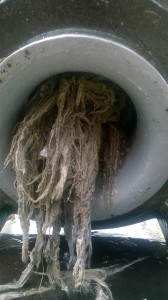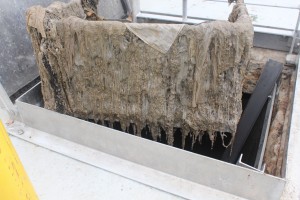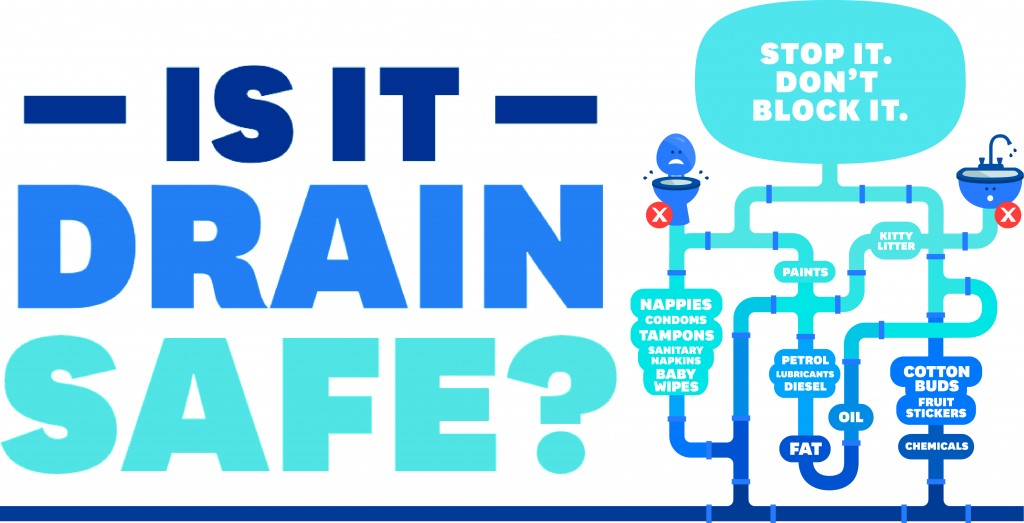Caring for our Sewers
Everything you flush down the toilet or wash down the drain ends up in our sewer network. Items that aren’t bio-degradable or are slow to break down, cause blockages and costly damage.
So, STOP IT. DON’T BLOCK IT. Think before you flush things like baby wipes down the toilet or wash items down the sink.
WIPES BLOCK SEWER SYSTEMS
Even though manufacturers around the world label and market their wipe products as ‘flushable’ or ‘biodegradable’, they take a long time to break down and contribute to millions of dollars damage each year.
Water utilities from around the world have joined together to provide an industry position on non-flushable and ‘flushable’ labelled products to influence accurate labelling practice by manufacturers.
International Flushability Statement_October 2016
Keep Wipes Out Of Pipes – December 2016
Find our more – Water Services Association of Australia

 Did you know that baby and cleaning wipes cause blockages in the sewer network?
Did you know that baby and cleaning wipes cause blockages in the sewer network?
- Wipes get caught in pipes and pumps causing blockages and damage.
- Wipes caused over $50,000 damage to Inverloch & Wonthaggi’s sewer last year alone!
- Do your part, simply bin any used wipes and nappies.
Wastewater Do & Don’ts
Don’t put the fats and oils from your roast down the drain!
Treated sewage is either reused or safely returned to our creeks, rivers and oceans. Putting the wrong things down the sewer affects our ability to treat and reuse the water and can cause damage to the system.
We all play a part in helping the treatment process by being aware of our own actions and by realising the kind of sewage we generate has a real effect on the treatment process and the environment.
|
|
We suggest you follow these handy hints:
- Use a sink strainer to prevent food scraps and other household waste, from going down the drain. Consider using a compost heap to dispose of food scraps.
- Soak up kitchen fats and oils using paper towels and kitty litter before disposing of these items in the rubbish bin.
- Wipe greasy pots and pans with a paper towel before washing.
- Dispose of items such as cotton buds, nappies, condoms, sanitary products and their wrappers in the household rubbish.
- Use less detergent. The average household uses three times more detergent than manufacturers recommend.
- Choose a washing detergent with a low salt content. Concentrated detergents often contain much less salt than conventional varieties.
- Ask your local pharmacy or council for advice on how to dispose of medicines and hazardous chemicals.
What happens if they do go into the system?
- These products can cause:
- Damaged pipes
- Blocked pipes which may impact your property or your neighbour’s property
- Harm to the environment
Where can I dispose of liquid waste?
You can take your household chemical products to a permanent or mobile drop-off point, where they will be collected and safely disposed of.
For more information call Sustainability Victoria on 1800 353 233
Where do I dispose of motor oil?
Used motor oil should be stored in an appropriate container and taken to your local oil collection facility so it can be cleaned and re-used.
Have you noticed suspicious disposal activities?
If you notice any suspicious activities, such as the discharge of illegal substances please contact South Gippsland Water on 1300 851 636 immediately so that we may prevent damage to the sewerage system and manage any risks to public and environmental health.

